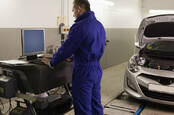Repairs specialist iFixit has urged the US Copyright Office to add exemptions to the Digital Millennium Copyright Act that would allow individuals to legally circumvent digital restrictions in the process of repairing hardware.
Exemptions to Section 1201 – the relevant bit – are renewed every three years, and are carved out by the Librarian of Congress on the basis of recommendations from the US Copyright Office.
For the first time, the iFixit, together with the Electronic Frontier Foundation and a slew of other right-to-repair advocates, asked for a sweeping exemption that would allow for the breaking of digital locks (often referred to as Technological Protection Measures, or TPMs) for the purpose of repairs, irrespective of what category the product belongs to.
If approved, this waiver would apply to anything that runs software in the normal course of its operations, from games consoles and smartphones to medical devices and tractors.
Crucially, it would extend the proposals to computers for the first time. Historically, computers used a modular design that permitted the user-replacement of certain components, like memory, storage, and the CPU. That has gradually started to change, with components soldered to the board, and serialised with technical measures (such as Apple’s T2 security chip) to prevent replacement.
“Historically, computers haven’t had TPMs. Your bog-standard PC, you can get in, you can access and replace anything. But what we’re starting to see now is, Apple has taken the security chip from iOS devices – the thing we have to jailbreak in iOS devices – and they’ve put it on their computers,” said iFixit founder Kyle Wiens.

Apple’s T2 custom secure boot chip is not only insecure, it cannot be fixed without replacing the silicon
“We’re seeing more secure boot techniques across the board, on all general-purpose computers. Historically, there wasn’t a circumvention needed to do service. Now, overwhelmingly, it is, and that’s been a huge sea change in the last three years.”
Predictably, this proposal met stiff opposition from the concerned industries. Morgan Reed, president of ACT, the App Association (formerly known as the Association for Competitive Technology), suggested that extending this proposal to medical devices could harm patient safety. Similar arguments were made by the automotive industry when voters were asked to approve a car-focused right-to-repair bill.
At the height of the pandemic, the US Public Interest Group published the results of a survey of 222 biomedical repair professionals [PDF] and their experiences in accessing crucial components or documentations in the months following March. Almost half said they were denied access to components, documentation, or service keys during a time when respiratory equipment was in scarce supply.

Heck yeah, we should have access to our own cars’ repair data: Voters in US state approve a landmark right-to-repair ballot measure
Medics ask for right to repair medical devices during pandemic
Last month, The Lancet medical journal published a letter from a trio of physicians and biomedical engineers which urged lawmakers to pass a medical right-to-repair law, claiming it would give them “the right to save lives.”
“With high-use demands brought on by COVID-19, even for newer equipment, repair and maintenance issues arise from high use related to patient volume, acuity, and turnover. COVID-19 has forced hospitals to use ventilators that have been in storage for many years, including some that were previously decommissioned,” the article stated.
“There is an opportunity now for the medical community to ensure that the medical field benefits from access rights to open data that are similar to the rights for consumer electronics and automobiles… During these extraordinary times, such legislation for the right to repair not only moves the medical field in a more affordable, efficient, and sustainable direction but also enables life-saving services to co
The Register














